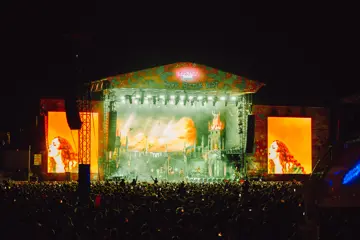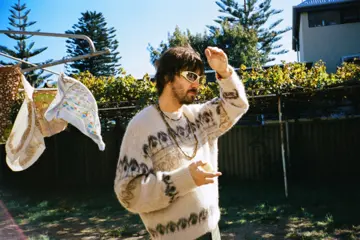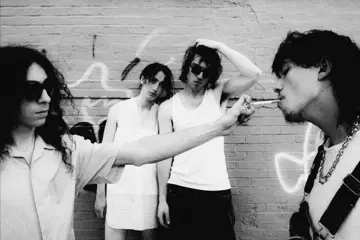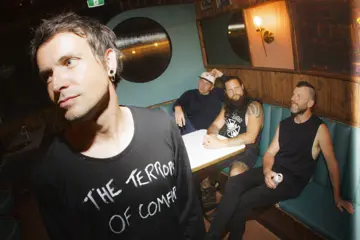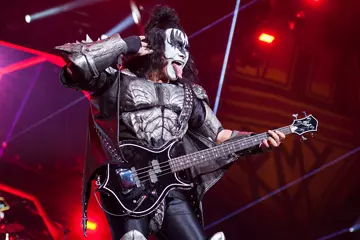 The Beths
The BethsThere’s tinsel wound around one of the microphone stands at the Black Bear Lodge in Brisbane’s Fortitude Valley this evening. However, while Christmas is only a few sleeps away, the jovial atmosphere in the crowd is largely thanks to WHALEHOUSE (“That’s one word, all capitals, thanks very much”), the self-described comedy punk band consisting of guitarists and vocalists Zoe Wilson and Amy-Rose Lawson, and drummer Sonya Chamberlain.
The group’s aesthetic seems inspired by punk and new wave, with Wilson and Lawson swapping a green guitar back and forth between each other through the set as they take turns singing lead vocals dancing all around the stage – even off the stage at some points, such as during Invisible Girl, when Lawson hides beneath the red curtain hanging behind them.
The trio throw in a cover of Devo’s Girl U Want alongside songs about fresh bread spaghetti, and other carbohydrates. “We just really have a lot of feelings about them,” Wilson says. While many of these songs feel like novelty numbers, it does seem like the band are exploring a wide range of topics, some perhaps more seriously than others. Of course, these include a few requisite ocean-themed songs, including the group’s recent single, Sexy Whale Beach Party.
By the end of their set, the band have almost everyone in the crowd either grinning, dancing, or singing along call-and-response style during the choruses, and while the frantic energy of their performance seems to be taking its toll on themselves – “Suddenly I’m tired,” Wilson admits at one point, singing the next song from the floor of the stage – they leave their audience feeling excited for all the future parties to come, including the one that’s only a few moments away.
Don't miss a beat with our FREE daily newsletter
As Silent Night plays over the stereo system, New Zealand band The Beths take to the stage in casual outfits – everyone’s wearing shorts except for drummer Ivan Luketina-Johnson, who’s braving the summer heat in pair of black jeans. The band were in Brisbane recently for BIGSOUND, and will be returning to support The Smith Street Band early next year, although tonight is the final headline show of their current Australian tour. Perhaps as a result, they seem a little tired, and singer-songwriter Elizabeth Stokes keeps the stage banter to a minimum.
Instead, Stokes lets her songs speak for her, and begins the set with Great No One, the opening track from the four-piece’s self-titled debut album. While the record was only recently released in August, earlier this year, it’s already garnered heavy acclaim, popping up on plenty of critics’ end-of-year lists.
However, there’s nothing that speaks to an album’s popularity, or the way it really connects with audiences, more than seeing a crowd respond to the songs in a live setting. And this crowd is very responsive, to say the least – the wooden floor is bouncing as people dance and sing along, often almost drowning out the backup vocals from guitarist Jonathan Pearce and bass player Benjamin Sinclair.
The band plays every song from their debut record, with most songs receiving the same welcome reception from the audience, although the crowd seem less familiar with Idea/Intent, a track from the band’s Warm Blood EP, also released earlier this year. “Vibrations in the throat can convey more than just sound/It’s the idea,” Stokes sings, although Pearce’s guitar playing is also more than just sound, and his solos on songs like this one emphasise the tumultuous emotions detailed in Stokes’ songwriting.
Little Death, Happy Unhappy, Future Me Hates Me, and Uptown Girl are all perfect power-pop examples of the emotional exegesis within Stokes’ writing, which explores the way someone can simultaneously feel generous and impatient with themselves. “It won’t happen again/It probably won’t happen again,” she sings on Future Me Hates Me – that one word, ‘probably’, saying everything.
Even the band’s choice of a Christmas cover, Have Yourself A Merry Little Christmas, is imbued with this ambiguity: “Someday soon we’ll all be together/If the fates allow,” Stokes sings. In the meantime, muddling through life involves weighing logic versus optimism, and despite the way Stokes may seem to embrace cynicism on songs like Happy Unhappy, there’s a deeply romantic undercurrent to her writing: “I was happy unhappy/But now I’m overthrown,” she sings.
It seems somewhat morbid to hear the crowd singing along to Little Death, although the song shares a similarly complex perspective on pain and pleasure. Vulnerability here is also a source of both disorientation and comfort: “You say my name/My balance takes a little rest”. The little death in this instance is perhaps best thought of as the French term le petite mort. In other words, feeling bad has never felt so good.











